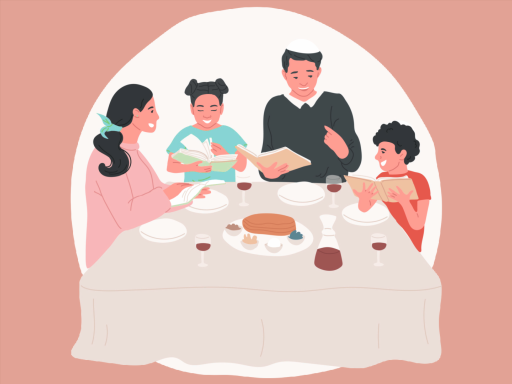Let’s start this out with an honest warning: While I’m the granddaughter of Jewish Holocaust survivors, I’m also the daughter of atheists, so my first Passover seder was in college. This is not an article about religion. It’s about the important lessons we can learn from a religious ritual (there’s a difference, to me at least). And by “we,” I mean adults and children — because for some reason, these are things that don’t always take the first time.
Sometimes I think it takes an outsider to distill these lessons for other outsiders. If you’ve come here from a completely alien land, I can tell you that Passover is the celebration of when God inflicted 10 plagues on the Egyptian pharaoh (probably Ramses II) as Moses led the enslaved Jews to freedom. There are some gruesome bits about boils, locusts, and killing children, which you would think isn’t polite dinner conversation, but again, I’m not here to judge. Anyway, people from any culture can appreciate a good story of liberation, sacrifice, and overcoming hardship. It’s also kind of fun to participate in such a ritualized dinner. To me, it’s the same feeling you get when you look up at the moon and realize how many other people on Earth are seeing the same thing, and that people have gazed at that rock in the sky for hundreds of thousands of years.
Even if you are Jewish, you might still need to remind yourself and your kids of the lessons Passover has to teach us all.
1. Gathering family and friends is crucial.
This goes without saying for most major holidays, but it’s worth reiterating that coming together as a family is important. The Haggadah — the manual that everyone uses during dinner to read the story and pray together — includes prompts for children and adults to participate actively, so the little ones can’t just be relegated to a kids’ table or sent to bed before the fun begins.
2. Feeding outsiders is important, too.
At the beginning of the seder, you’re supposed to open the door and say, “All who are hungry, let them enter and eat. All who are in need, let them come celebrate Passover with us.”
While we’re not so much into literally inviting strangers over for dinner, the point is to think of the hungry and poor as you’re about to dig into a feast, and hopefully do something to help them later.
3. Empathize with the suffering of others.
Moses was adopted by a pharaoh and totally could have maintained his cushy royal life in Egypt, had he not realized how much the people of his birth were suffering. While that’s not necessarily a story that people discuss during Passover, I like how the organization Jew Belong explains why everyone repeats the same story of the Exodus every year: “The seder is a chance for us all to be taken on a short but important journey from slavery to freedom, and to join millions of Jews and non-Jews all over the world doing the same thing. We are not merely telling a story. We are being called to an act of empathy.”
As we remember the suffering of those people thousands of years ago, we can also remember more recent struggles of Jews and non-Jews alike. Many seders I’ve been to discuss American slavery and the Civil Rights movement, for instance.
4. Hand-washing is downright godly.
There are not one but two times that you’re supposed to wash your hands during the seder. This is pre-pandemic, even.
5. Kids can, and should, ask questions.
The four questions are such a sweet moment in the seder when the youngest person gets to ask what Passover is: Why do we celebrate? Why do we eat matzoh? Why do we eat bitter herbs and dip them twice in salt water? Why do we sit leaning? This is so different from other religious occasions in which children must be seen and not heard. Then there’s another passage that talks about the wise child, the wicked child, the simple child, and the child who doesn’t know how to ask. All but the latter ask variations of questions about the meaning of Passover. It’s a good way to acknowledge that kids have different ways of learning, but that their curiosity is important.
5. Being resourceful in a pinch is the only way to survive.
I know some people who really like the taste of matzoh, but I don’t think you’re actually supposed to. The point of the unleavened bread is to acknowledge the sacrifices the Jews made when fleeing Egypt. We’re also thinking about the way Jews fled pogroms in Russia, the Spanish Inquisition, and the Holocaust.
“The entire holiday is rooted in glorifying a moment when life unfolded in very unexpected ways — and human beings found meaning, even liberation, in it,” writer and editor Alana Newhouse wrote in the New York Times.
Over the course of history, people get by somehow, and this is a good reminder.
6. Freedom isn’t, as they say, free.
That’s a cheesy phrase usually uttered by people with different politics from mine, but it does hold true. Here’s a better what of putting it:
“The famous Passover phrase, ‘Let my people go,’ is abbreviated,” Rabbi David Wolpe explained in Time magazine years ago. “The full sentence is, ‘Let my people go that they may serve me.’ True freedom is abundance of opportunity, not absence of obligation.”
I could also add a few more lessons here, like that horseradish is delicious and there is no such thing as a gefilte fish. But those are fun things your kids can learn on their own. Happy Pesach, everyone.
Source: Read Full Article

